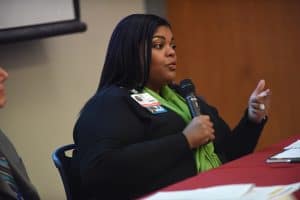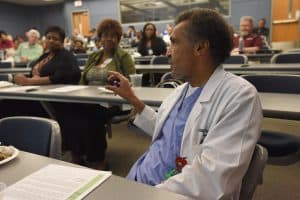Black History Panel Discusses Higher Education
| Feb. 28, 2017 | A group of Arkansas educators and students convened at UAMS on Feb. 23 to discuss issues facing black students throughout the education system.
More than 50 UAMS faculty, staff and students attended the event, hosted by the Chancellor’s Committee for Diversity and the UAMS Center for Diversity Affairs as part of Black History Month. The panel identified concerns and problems for black students and what can be done to address them.
Sasha Ray, a second-year medical student at UAMS, said society typically underestimates the time and effort required to ensure more students are successful.
“You have to start the process so much earlier and that gets neglected a lot,” said Ray. “We talk about college and high school programs, but it’s something that really and truly, in order for our communities to be successful on a large scale, starts much earlier.”
Michael Nellums, Ed.D., principal of Pine Bluff High School, said he encounters many students who are “woefully unprepared” for secondary education and the rigors of academia, which includes substandard reading levels.
“It’s a systemic, perpetual issue that keeps spinning in the same direction,” he said.
Lanita White, Pharm.D., an assistant professor in the UAMS College of Pharmacy and director of the UAMS 12th Street Health & Wellness Center, said she sees the same issue among students in graduate and professional school.
“They’ve done well in college, but they don’t have the foundational study skills they need, or the skills and abilities to self-teach and become proficient at life-long learning,” said White. “That presents a barrier for them because in graduate and professional school you’re drinking from a fire hose, so to speak and if you are unable to work through the material, learn it, and retain that material you are at a distinct disadvantage.”

Lanita White, Pharm.D., director of the UAMS 12th Street Health & Wellness Center, said more should be done in the form of mentoring to young black students.
Jonathan Hutchins, PhD., an associate professor at Arkansas Baptist College in Little Rock, said there are solutions available, however for change to occur, it must be demanded.
“It’s maddening to know black students are attending graduate and professional schools and are having certain problems, however, we’re not addressing them,” said Hutchins. “We know what the data says, we know what the gaps are, we know what works, we know what doesn’t work, but as a society, we refuse to listen to what the data says and put it into action.”
David Davies, Ph.D., associate professor in the UAMS College of Medicine, said some research shows one way to help minority students reach higher education and be more successful is for universities to have a more diverse faculty.
White said more African-American professionals need to give back to young students in the form of mentorship in addition to shifting goals.
“Many times, I find in elementary and middle schools, the goal is just to get them through high school,” said White. “I think that’s a problem. Our goal should be to get our students beyond high school. We should strive to ensure all students reach their highest potential – whatever that may be. We should encourage students to seek out a profession that they love and enjoy and to contribute to society by giving back to help others find their own success.”
Acknowledging there are several issues to be addressed, Ray said one of the bigger issues is encouraging children to read throughout life and helping them stay at grade-level throughout their school career.

Billy Thomas, M.D., M.P.H., vice chancellor for diversity and inclusion, offers a comment during the panel discussion.
“Reading took me somewhere mentally,” said Ray. “Even though I was this girl in Little Rock and didn’t get out of the house much, I went everywhere. It expanded what I thought I could do and the things that were open to me and it helped me keep up academically.”
Nellums encouraged “consistent and persistent action” to improve education.
“It’s not enough to have a program during Black History Month and be missing in action the other 11 months of the year,” he said.
Speaking prior to the panel discussion, UAMS Provost Stephanie Gardner, Pharm.D., Ed.D., said UAMS’ promotion of interprofessional education strives to encourage interaction between students of different experiences and backgrounds.
“It’s those very differences that make the learning so rich,” said Gardner. “As a consequence, we’re hoping the students are more skilled at teamwork and collaboration, and understand inclusiveness and flexibility in ways that will eventually help their patients, future learners they teach, and research they conduct.”
UAMS Chancellor Dan Rahn, M.D., said it is crucial for society to realize “we’re one community.”
“Everyone pays the price for absence of opportunity in any segment of our society,” said Rahn. “Everyone pays the price for poor education that is disproportionate in any portion of our society. We are, in fact, all in this together.”
